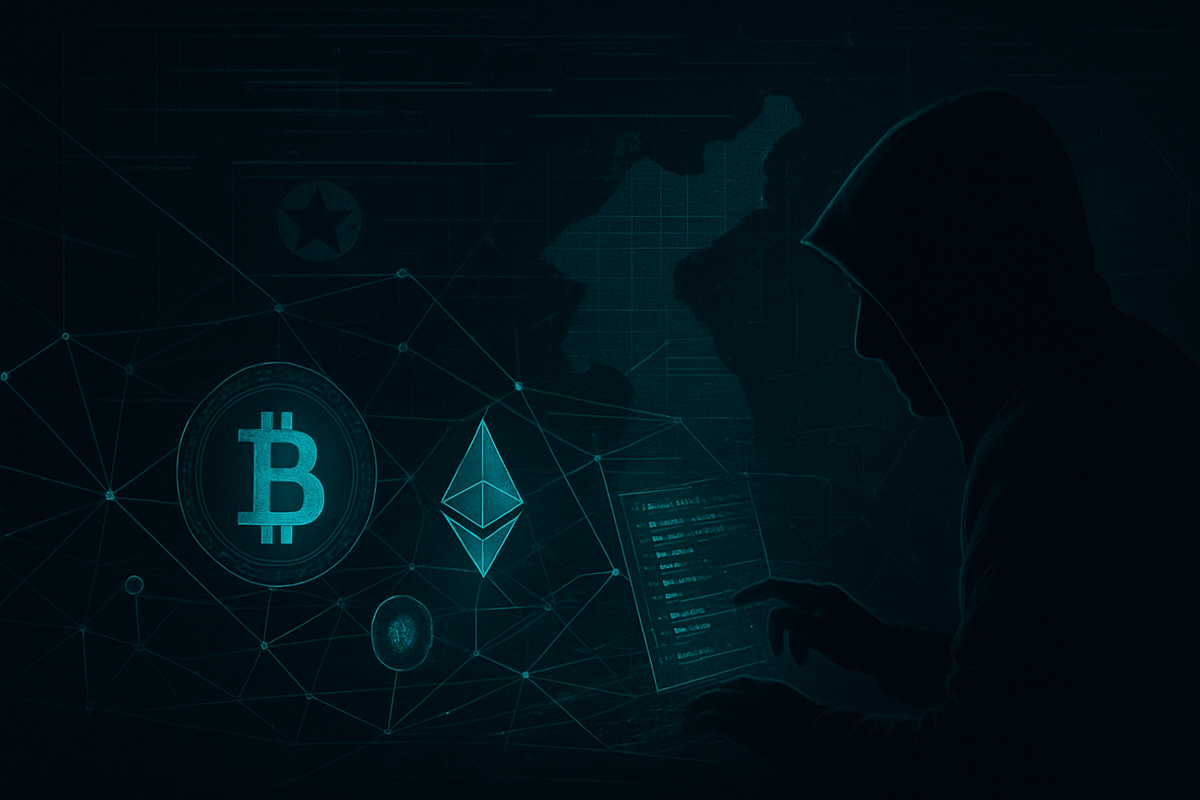
Recent alarming reports reveal that North Korea has dramatically escalated its sophisticated use of cryptocurrency theft and the deployment of illicit IT workers globally to bypass stringent United Nations (UN) sanctions. This multifaceted digital offensive is reportedly funneling billions of dollars directly into Pyongyang's prohibited weapons of mass destruction (WMD) programs, posing a severe challenge to international security and the efficacy of global non-proliferation efforts. The ongoing cyber campaigns highlight a critical vulnerability in the international financial system and a growing threat to corporate cybersecurity worldwide.
The immediate implications are stark: a rogue state is effectively circumventing economic isolation, funding its most dangerous ambitions, and exposing a significant chasm in the international community's ability to enforce sanctions. The sheer scale of the financial gains, estimated at over $1.65 billion in cryptocurrency stolen in 2025 alone, underscores the urgency with which global powers are now attempting to counter these evolving tactics.
Pyongyang's Shadow Economy: A Deep Dive into Digital Evasion
North Korea's illicit financial operations have reached unprecedented levels, with a focus on high-value cryptocurrency heists and the exploitation of a global network of IT professionals. From January to September 2025, an estimated $1.65 billion in cryptocurrency was pilfered by North Korean cyber forces. A particularly significant incident in February 2025 saw the theft of $1.4 billion from the cryptocurrency exchange Bybit (BYBIT). This follows an already substantial $1.2 billion in illicit cryptocurrency gains throughout 2024, indicating a clear and accelerating trend. These stolen digital assets, particularly stablecoins, are then reportedly utilized for critical procurement transactions, including the acquisition of military equipment and essential raw materials like copper, crucial for munitions production.
Complementing these cyber thefts is the regime's extensive deployment of IT workers to at least eight countries, including major players like China and Russia, as well as Laos, Cambodia, Equatorial Guinea, Guinea, Nigeria, and Tanzania. These workers operate under disguised identities, securing fraudulent remote employment with unsuspecting companies, including some in Japan and the United States. A 2024 38 North report cited instances of North Korean IT workers contributing to animation projects for major entertainment entities such as Amazon (NASDAQ: AMZN) and HBO Max (NASDAQ: WBD). They leverage both unwitting and witting foreign facilitators to establish US-based presences, create accounts on popular job search sites, and even have proxies attend virtual interviews, ultimately gaining access to company networks and sensitive data. The Multilateral Sanctions Monitoring Team (MSMT), established in October 2024, has been at the forefront of tracking these activities. The MSMT, formed by a coalition of countries including the US, Australia, and Japan, emerged after Russia's veto in April 2024 led to the disbandment of the UN Security Council's previous panel of experts, leaving a critical void in sanctions monitoring.
The timeline of these events paints a concerning picture of escalating sophistication. Russia's veto in April 2024 created a significant enforcement gap, which North Korea appears to have readily exploited. The subsequent formation of the MSMT in October 2024 was a direct response to this challenge, signaling a renewed international effort to monitor Pyongyang's illicit activities. However, the continuous stream of large-scale cryptocurrency thefts throughout 2025 demonstrates that North Korea has remained aggressively active despite increased scrutiny. Furthermore, reports indicate a planned expansion of North Korean labor to Russia, with intentions to send 40,000 laborers, including IT workers, further cementing an alliance where North Korea provides weapons and troops to Moscow's forces in exchange for crucial backing and potential avenues for sanctions evasion. Initial market reactions have been muted, as the direct impact on specific public companies is often difficult to quantify immediately, but the broader cybersecurity industry is bracing for increased demand for robust defense solutions.
Corporate Battleground: Winners and Losers in the Shadow Economy
North Korea's audacious strategies of cryptocurrency theft and the deployment of clandestine IT workers have created a complex and often perilous landscape for public companies and financial institutions worldwide, while simultaneously opening significant opportunities for the cybersecurity and compliance sectors. The direct financial losses and reputational damage for victims are substantial, but the broader market reaction is also creating new demands and shifting priorities.
Among the most significant losers are technology and IT companies that inadvertently contract North Korean IT workers. These companies face severe reputational risks, potential legal repercussions, and even sanctions designations under international authorities. Beyond the legal headaches, there's the insidious threat of these workers gaining privileged access to corporate networks, potentially leading to malicious cyber intrusions, data theft, and ransomware attacks. Firms engaged in outsourcing, particularly for software and mobile application development, are highly susceptible. Notably, reports have indicated that major entertainment companies such as HBO Max (NASDAQ: WBD) and Amazon (NASDAQ: AMZN) have unwittingly engaged North Korean animators, highlighting the pervasive nature of this threat. Furthermore, cryptocurrency exchanges are direct and frequent targets. Platforms like Bybit (BYBIT), LND.fi, WOO X, and Seedify have been explicitly named as victims of large-scale crypto heists, suffering immense financial losses and a significant erosion of user trust and brand reputation. Traditional banks and payment processors also stand to lose considerably if they are used, wittingly or unwittingly, for money laundering activities linked to North Korea's cybercrimes. A failure to implement robust Anti-Money Laundering (AML) and Know Your Customer (KYC) protocols can result in severe legal consequences, including substantial fines and sanctions designations.
Conversely, a new breed of winners is emerging from this volatile environment. Identity verification and background check firms are experiencing a surge in demand as companies scramble to implement more rigorous screening processes to avoid hiring illicit North Korean workers. Similarly, Managed Security Service Providers (MSSPs) and incident response firms are becoming indispensable, offering expertise to help businesses recover from attacks and fortify their defenses against sophisticated state-sponsored threats. In the financial sector, blockchain analytics and AML/KYC solution providers are seeing a significant uptick in business. Companies like Elliptic, which offer advanced tools to identify, track, and block illicit funds, are crucial for financial institutions and cryptocurrency exchanges striving to comply with regulations and protect their assets. Financial intelligence firms also play a vital role, providing insights into evolving illicit financial networks. Within the broader cybersecurity industry, threat intelligence and research firms, such as Palo Alto Networks (NASDAQ: PANW) with its Cortex team/Unit 42, are at the forefront of identifying and analyzing North Korea's evolving cyber capabilities, providing critical insights for both governments and the private sector. The increased threat also drives demand for a wide array of security software and services vendors, including those specializing in endpoint detection and response (EDR), network security, identity and access management (IAM), and security awareness training. Lastly, compliance and risk management consultants are becoming essential partners, guiding organizations through the complex web of sanctions and helping them implement robust defenses against evasion risks.
A Looming Threat: Wider Implications for Global Finance and Security
North Korea's sophisticated evasion tactics represent more than just isolated incidents of cybercrime; they signify a profound shift in how rogue states can circumvent traditional financial controls, with far-reaching implications for international finance, global security, and the very architecture of sanctions enforcement. This digital arms race is forcing a re-evaluation of regulatory frameworks and cybersecurity defenses worldwide.
These activities are emblematic of broader industry trends, particularly the rise of cyber-enabled illicit finance. Cryptocurrency's inherent anonymity, liquidity, and ease of global transfer make it an irresistible tool for cybercriminals and sanctioned entities. This facilitates money laundering on an unprecedented scale, undermining traditional financial oversight. We are also witnessing the professionalization of cybercrime, where state-sponsored groups operate with the efficiency and sophistication of legitimate businesses, leveraging advanced tools and techniques, including increasingly, AI integration to automate attacks and scale social engineering efforts. The lines between financially and politically motivated cyberattacks are increasingly blurred, posing systemic risks across various sectors. The staggering $1.65 billion in cryptocurrency stolen by North Korea from January to September 2025, including the $1.4 billion heist from Bybit in February 2025, underscores the sheer scale of this threat to market integrity.
The ripple effects on international finance are profound. North Korea's continuous extraction of vast sums of value from the global virtual asset market, particularly from decentralized finance (DeFi) protocols, poses a systemic risk to market integrity and stability. This necessitates a fundamental strengthening of Anti-Money Laundering (AML) and Know Your Customer (KYC) frameworks, increasing compliance costs and complexity for legitimate financial institutions. Furthermore, the infiltration of North Korean IT workers into global companies introduces significant supply chain vulnerabilities. These workers are not just earning illicit income; they have the potential to exfiltrate sensitive data, intellectual property, and even export-controlled military technology, with potentially devastating economic consequences. On the international security front, the most direct and alarming implication is the sustained funding of North Korea's prohibited WMD and ballistic missile programs. This directly undermines global non-proliferation efforts and grants the regime greater impunity, exacerbating geopolitical tensions, especially given its deepening cooperation with countries like Russia. The continuous revenue stream also allows Pyongyang to heavily invest in and refine its cyber warfare capabilities, creating a dangerous feedback loop where improved hacking tools lead to more successful thefts, further enhancing its capacity for espionage and disruption.
In response, regulatory and policy implications are intensifying. While UN Security Council resolutions prohibit North Korean workers from earning income abroad and sanction illicit trade, enforcement remains a significant challenge, especially after Russia's veto disbanded the UN Panel of Experts. However, the international community is adapting. The Financial Action Task Force (FATF) has issued clear guidance on virtual assets, urging member states to implement robust measures against money laundering and proliferation financing. National-level responses are also escalating, with countries like the United States, United Kingdom, Japan, and South Korea issuing advisories and imposing targeted sanctions against facilitators of North Korea's IT worker schemes and crypto laundering. Enforcement efforts are increasingly prioritizing virtual asset platforms that facilitate money laundering, particularly mixing services like Blender and Tornado Cash. Critically, there is a growing emphasis on international cooperation, harmonized legal frameworks for crypto regulation, and enhanced blockchain analytics capabilities to trace illicit funds. The formation of the Multilateral Sanctions Monitoring Team (MSMT) in October 2024 by a coalition of concerned states is a testament to this collaborative approach, aiming to fill the monitoring void. While North Korea has a long historical precedent of sanctions evasion, from illicit ship-to-ship transfers to complex shell companies, the current scale and sophistication, particularly the weaponization of cryptocurrency and the systematic deployment of state-sponsored IT workers for large-scale cyber theft, represent a distinct and unprecedented evolution. The decentralized and borderless nature of digital assets, coupled with the global demand for remote IT services, offers novel avenues for evasion that traditional enforcement mechanisms are still struggling to contain.
The Evolving Chessboard: What Comes Next
The trajectory of North Korea's digital illicit activities suggests a continuous and escalating cat-and-mouse game with the international community. In the short term (next 1-3 years), Pyongyang's cyber actors, particularly the notorious Lazarus Group, are expected to significantly enhance their attack methodologies. This will involve deeper integration of advanced artificial intelligence to refine attack vectors, improve deception tactics, and develop more sophisticated malware and command-and-control infrastructure. Their targets will likely diversify beyond traditional cryptocurrency exchanges to increasingly vulnerable decentralized finance (DeFi) protocols, cross-chain bridges, and non-fungible token (NFT) platforms. Simultaneously, the deployment of North Korean IT workers is anticipated to expand beyond conventional IT roles, infiltrating sectors such as industrial design and architecture, posing new risks related to espionage and access to sensitive infrastructure blueprints.
In response, the cryptocurrency industry will likely accelerate its investment in robust cybersecurity audits, penetration testing, and advanced threat detection systems. Regulatory bodies, particularly in the United States and South Korea, are expected to intensify efforts to sanction crypto mixers and other services facilitating money laundering. There will also be a heightened focus on rigorous employment due diligence, leveraging AI-powered screening tools to identify and prevent the hiring of North Korean IT workers. Longer term (3+ years), a persistent stalemate is the most probable scenario, characterized by North Korea's continuous adaptation to bypass restrictions and the international community's struggle to keep pace. Pyongyang's reliance on the cyber domain for economic gain, intelligence, and political influence is expected to deepen, leading to a continuous evolution of its cyber capabilities. This ongoing threat will necessitate more robust international cooperation, harmonized regulatory frameworks, and advanced cybersecurity protocols to safeguard the global digital economy, with the effectiveness of sanctions increasingly tied to the ability to enforce regulations on decentralized financial technologies.
North Korea's strategic pivots will largely revolve around leveraging technological advancements and exploiting regulatory gaps. The regime is already increasing its use of AI for more sophisticated social engineering campaigns, automated malware development, and creating highly convincing fake personas for IT workers. Reports indicate a "complete dependency on AI" for these operations, with tools like Claude being utilized to create professional backgrounds. Pyongyang may also increasingly target critical infrastructure and supply chains through compromised IT workers or direct cyberattacks to achieve strategic objectives beyond mere financial theft. The exploration of new and emerging decentralized financial technologies that are less regulated or have inherent vulnerabilities will be a constant, allowing them to shift focus to evade detection. Furthermore, North Korea will likely continue to exploit geopolitical divisions, leveraging alliances with countries like Russia to secure avenues for bypassing sanctions or for technical cooperation in cyber operations.
For North Korea, the market opportunities lie in the decentralized, minimally regulated, and easily transferable nature of cryptocurrencies, offering a low-cost, high-reward method for illicit financial gain. State-backed operations allow for significant scale and scope, and the regime continues to successfully exploit human vulnerabilities through phishing and social engineering. However, challenges include enhanced tracing and sanctions from blockchain analytics firms and regulatory bodies, improved cybersecurity defenses from increasingly aware targets, and more rigorous due diligence and detection methods (including AI detectors for deepfakes) being implemented by companies. The increasing focus on sanctioning facilitators also poses significant legal and financial risks for those involved. The most likely scenario remains an "escalating cat-and-mouse game," where North Korea consistently innovates its evasion tactics, and the international community responds with evolving countermeasures, perpetuating a cycle of theft, laundering, and counter-enforcement. While a significant disruption of illicit flows is a less likely outcome due to geopolitical complexities, the ongoing struggle will undoubtedly spur a technological arms race in both cyber defense and offense, pushing both state and non-state actors to develop more sophisticated tools and techniques for protecting or exploiting digital assets and networks.
Navigating the Digital Front: A Comprehensive Wrap-Up
North Korea's sophisticated and relentless pursuit of cryptocurrency theft and the strategic deployment of illicit IT workers have fundamentally reshaped the landscape of sanctions evasion. This digital offensive serves as a primary financial artery for Pyongyang's prohibited WMD and ballistic missile programs, posing an enduring and escalating threat to global peace and security. The Multilateral Sanctions Monitoring Team (MSMT) has highlighted the staggering scale of these operations, with billions stolen in recent years, underscoring the regime's deep reliance on these illicit activities.
Key takeaways emphasize that North Korea's cyber capabilities, spearheaded by groups like Lazarus, are among the most advanced globally. They exploit the decentralized and often less regulated nature of cryptocurrencies, employing sophisticated laundering techniques involving mixers and cross-chain bridges. The IT worker schemes are equally cunning, leveraging fraudulent identities to infiltrate global companies and siphon earnings back to the regime, sometimes even exfiltrating sensitive data or deploying malware through techniques like "EtherHiding." This dual strategy effectively undermines international sanctions, creating a significant loophole that directly funds a rogue state's most dangerous ambitions.
Moving forward, the market can expect an acceleration and automation of North Korean cyberattacks, with continuous diversification of targets to include emerging DeFi protocols and NFT platforms. The cryptocurrency sector, despite growing awareness, remains a vulnerable target due to its inherent characteristics and varying regulatory landscapes. The lasting impact is profound: a persistent threat to global financial integrity, a direct challenge to non-proliferation efforts, and a continuous drain on the resources of companies and financial institutions worldwide. This ongoing struggle also underscores the economic strain on the North Korean populace, whose resources are diverted to the regime's illicit pursuits.
Investors and entities operating in the cryptocurrency and technology sectors must remain highly vigilant in the coming months. They should anticipate increased regulatory scrutiny and intensified efforts by international bodies, including the MSMT, to track and disrupt North Korean financial networks, leading to more sanctions against facilitators and virtual asset platforms. A continuous call for enhanced cybersecurity measures will necessitate significant investments in zero-trust models, multi-factor authentication, and robust training against social engineering. Companies hiring remote IT workers must implement more rigorous background checks and verification processes to mitigate supply chain and hiring risks. Furthermore, the industry must watch for the evolution of defense mechanisms to counter North Korea's adapting tactics, such as EtherHiding, requiring collaborative monitoring of blockchain activity and coordinated actions. Finally, geopolitical developments, particularly North Korea's deepening ties with countries like Russia, could further complicate sanctions enforcement and provide new avenues for evasion, demanding close monitoring from investors.
This content is intended for informational purposes only and is not financial advice





